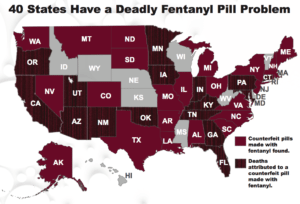Keeping Counterfeit Pills Out Of U.S. Included In Recommendations From Opioid Commission
 As reported by Stat News, The President’s Commission on Combating Drug Addiction and the Opioid Crisis released a final draft with 56 suggestions for actions the United States can take to help end the opioid crisis. The recommendations covered a broad range of topics including federal funding and programs, addiction prevention, monitoring of prescription drugs, supply reduction, enforcement strategies, addiction treatment, overdose reversal and recovery, and research and development.
As reported by Stat News, The President’s Commission on Combating Drug Addiction and the Opioid Crisis released a final draft with 56 suggestions for actions the United States can take to help end the opioid crisis. The recommendations covered a broad range of topics including federal funding and programs, addiction prevention, monitoring of prescription drugs, supply reduction, enforcement strategies, addiction treatment, overdose reversal and recovery, and research and development.
Among those suggestions were confronting counterfeit pill distribution in the U.S. “The Commission recommends that federal law enforcement agencies expressly target Drug Trafficking Organizations and other individuals who produce and sell counterfeit pills, including through the internet.” Although 40 states currently report counterfeit pills made with fentanyl, the actual breadth of the counterfeit fentanyl pill problem is suspected to be undercounted because many have failed to look for fentanyl and other deadly contaminants when investigating opioid suspected deaths.
The Partnership for Safe Medicines supports other recommendations made in our 40 States and Counting report. To stop the importation of fentanyl in finished form, we need to sufficiently resource our CBP officers. That includes both making their job easier by requiring electronic data on packages before they arrive at international mail facilities, as well as giving them the resources to handle the volume. We also need to handle the problem of domestic illegal pill manufacturing. A good first step would be to ensure that anyone without the legitimate licenses to manufacture medication, such as drug manufacturers or specific types of pharmacists, doesn’t have the right to purchase or own a pill press or other forms of manufacturing equipment.
The commission spent seven months reviewing the opioid crisis, gathering testimony and public input from health officials, law enforcement, policymakers, individuals, and families. Although President Trump declared the opioid crisis a public health emergency on Oct 26, 2017, it is not clear if the White House will approve or reject the final report.